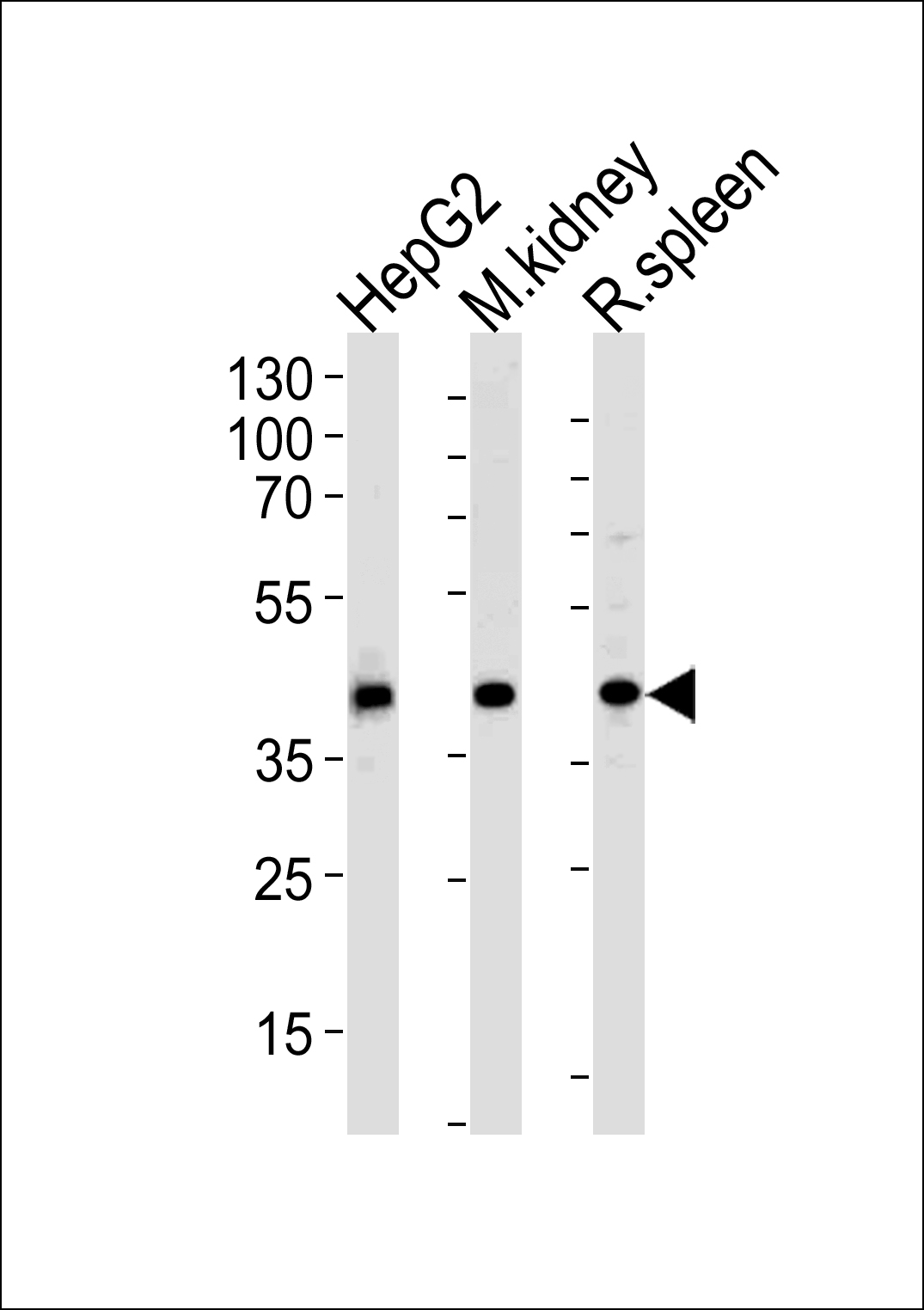ACADL Antibody (N-term)
Affinity Purified Rabbit Polyclonal Antibody (Pab)
- 产品详情
- 实验流程
- 背景知识
Application
| WB, E |
|---|---|
| Primary Accession | P28330 |
| Other Accession | NP_001599.1 |
| Reactivity | Human, Rat, Mouse |
| Host | Rabbit |
| Clonality | Polyclonal |
| Isotype | Rabbit IgG |
| Calculated MW | 47656 Da |
| Antigen Region | 14-43 aa |
| Gene ID | 33 |
|---|---|
| Other Names | Long-chain specific acyl-CoA dehydrogenase, mitochondrial, LCAD, ACADL |
| Target/Specificity | This ACADL antibody is generated from rabbits immunized with a KLH conjugated synthetic peptide between 14-43 amino acids from the N-terminal region of human ACADL. |
| Dilution | WB~~1:1000 E~~Use at an assay dependent concentration. |
| Format | Purified polyclonal antibody supplied in PBS with 0.09% (W/V) sodium azide. This antibody is purified through a protein A column, followed by peptide affinity purification. |
| Storage | Maintain refrigerated at 2-8°C for up to 2 weeks. For long term storage store at -20°C in small aliquots to prevent freeze-thaw cycles. |
| Precautions | ACADL Antibody (N-term) is for research use only and not for use in diagnostic or therapeutic procedures. |
| Name | ACADL (HGNC:88) |
|---|---|
| Function | Long-chain specific acyl-CoA dehydrogenase is one of the acyl-CoA dehydrogenases that catalyze the first step of mitochondrial fatty acid beta-oxidation (FAO), breaking down fatty acids into acetyl- CoA and allowing the production of energy from fats (PubMed:17564966, PubMed:24591516, PubMed:32389575). The first step of FAO consists in the proR-proR stereospecific alpha, beta-dehydrogenation of fatty acyl- CoA thioesters using the electron transfer flavoprotein (ETF) as their physiologic electron acceptor, resulting in the formation of trans-2- enoyl-CoA ((2E)-enoyl-CoA) (PubMed:17564966, PubMed:21237683). Among the different mitochondrial acyl-CoA dehydrogenases, long-chain specific acyl-CoA dehydrogenase activity overlaps with that of ACADV and ACAD9, acting on saturated and unsaturated acyl-CoAs with 6 to 24 carbons with a preference for 8 to 18 carbons long primary chains (PubMed:17564966, PubMed:21237683, PubMed:8823175). Plays a primary role in FAO in tissues where it is the main long-chain ACAD expressed, such as the lung, specifically in type 2 alveolar cells (responsible for surfactant production) (PubMed:17564966, PubMed:24591516). Probably responsible for beta-oxidation of bulky substrates including branched chain fatty acyl-CoAs and sterol derivatives thanks to its enlarged substrate-binding cavity (PubMed:38839792). |
| Cellular Location | Mitochondrion matrix {ECO:0000250|UniProtKB:P15650} |
| Tissue Location | Expressed at mRNA and protein levels in lungs, where it localizes specifically in alveolar epithelial cells (alveolar type II pneumocytes) (PubMed:17564966, PubMed:24591516). Also expressed at mRNA levels in prostate, thyroid gland, kidney, heart and muscle (PubMed:17564966). |
For Research Use Only. Not For Use In Diagnostic Procedures.
Provided below are standard protocols that you may find useful for product applications.
BACKGROUND
The protein encoded by this gene belongs to the acyl-CoA dehydrogenase family, which is a family of mitochondrial flavoenzymes involved in fatty acid and branched chain amino-acid metabolism. This protein is one of the four enzymes that catalyze the initial step of mitochondrial beta-oxidation of straight-chain fatty acid. Defects in this gene are the cause of long-chain acyl-CoA dehydrogenase (LCAD) deficiency, leading to nonketotic hypoglycemia.
REFERENCES
Bailey, S.D., et al. Diabetes Care 33(10):2250-2253(2010)
Maher, A.C., et al. Mol. Genet. Metab. 100(2):163-167(2010)
Illig, T., et al. Nat. Genet. 42(2):137-141(2010)
Talmud, P.J., et al. Am. J. Hum. Genet. 85(5):628-642(2009)
Lu, Y., et al. J. Lipid Res. 49(12):2582-2589(2008)
终于等到您。ABCEPTA(百远生物)抗体产品。
点击下方“我要评价 ”按钮提交您的反馈信息,您的反馈和评价是我们最宝贵的财富之一,
我们将在1-3个工作日内处理您的反馈信息。
如有疑问,联系:0512-88856768 tech-china@abcepta.com.























 癌症的基本特征包括细胞增殖、血管生成、迁移、凋亡逃避机制和细胞永生等。找到癌症发生过程中这些通路的关键标记物和对应的抗体用于检测至关重要。
癌症的基本特征包括细胞增殖、血管生成、迁移、凋亡逃避机制和细胞永生等。找到癌症发生过程中这些通路的关键标记物和对应的抗体用于检测至关重要。 为您推荐一个泛素化位点预测神器——泛素化分析工具,可以为您的蛋白的泛素化位点作出预测和评分。
为您推荐一个泛素化位点预测神器——泛素化分析工具,可以为您的蛋白的泛素化位点作出预测和评分。 细胞自噬受体图形绘图工具为你的蛋白的细胞受体结合位点作出预测和评分,识别结合到自噬通路中的蛋白是非常重要的,便于让我们理解自噬在正常生理、病理过程中的作用,如发育、细胞分化、神经退化性疾病、压力条件下、感染和癌症。
细胞自噬受体图形绘图工具为你的蛋白的细胞受体结合位点作出预测和评分,识别结合到自噬通路中的蛋白是非常重要的,便于让我们理解自噬在正常生理、病理过程中的作用,如发育、细胞分化、神经退化性疾病、压力条件下、感染和癌症。






